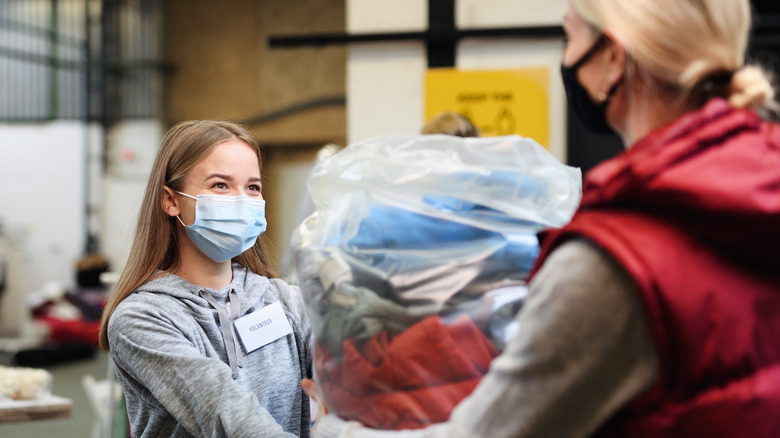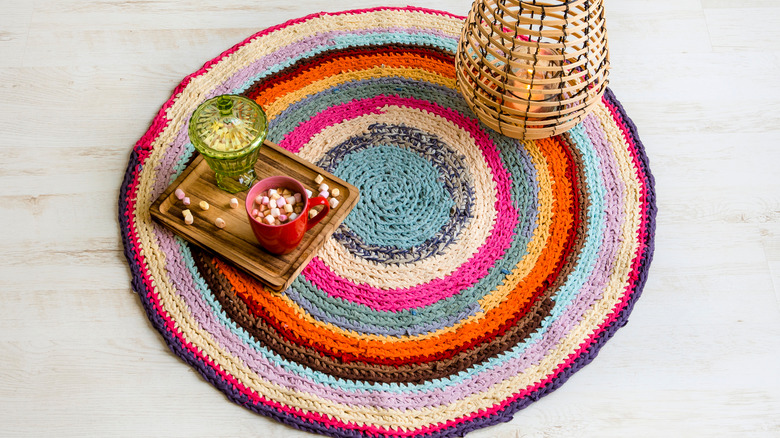Why You Should Think Twice Before Throwing Away Old T-Shirts
We all have them: old t-shirts that we've kept around way too long. Whether it's for sentimental reasons, like the first time you saw Taylor Swift and just had to buy a tee at her concert, or because we're not sure what to do with them, old t-shirts, like most old clothes, can pile up and up and up.
A 2017 State of Reuse Report launched by Savers, a global thrift retailer, found that 26 billion pounds — that's right: billion — of clothes end up in landfills every year in the United States. Of that amount, 95% could actually be reused or repurposed (via Saver). While we may think that our old t-shirts, most of which tend to be cotton, won't do much harm in a landfill, that couldn't be further from the truth.
"Natural fibers go through a lot of unnatural processes on their way to becoming clothing," CEO of the Sustainable Apparel Coalition Jason Kibbey tells Newsweek. "They've been bleached, dyed, printed on, scoured in chemical baths."
Those chemicals can wreak havoc on water supplies and if they're burned in an incinerator, they release toxins into the air — both scenarios contributing to damaging the earth and adding to climate change.
So, instead of being one of the millions of people who throws out their old tees, here are other reasons why they should end up anywhere, but in the trash.
Donate your t-shirts
There are so many people who go without not just in the U.S., but in the world. Places like Goodwill and the Salvation Army are usually the first ones to come to mind when people think about donating, but they're certainly not the only places. In addition to your local charities or clothing drives, there's a whole slew of national and international organizations, like Vietnam Veterans of America and Planet Aid that collect clothing donations (via Good Housekeeping).
Although donating isn't without its issues. Only 20% of donated clothes actually end up back in the domestic market, while the rest find themselves in the global used clothing trade, particularly in Sub-Saharan African nations (via NPR). However, there's two sides to this coin. On one hand, the global clothing trade negatively effects the local textile industries in regard to job security for hundreds of thousands of workers in countries like Ghana, Zambia, and Nigeria because the need to make clothes locally isn't there. But on the other hand, these used clothes create economic independence among women in these nations (via Sustainable Review).
"In buying their clothes from salaula [used clothing] rather than being presented with them by their husband as customary conjugality once prescribed, women are shaking men's domestic imperialism," writes Dr. Karen Tranberg Hansen (via Gale Academic Onefile).
Whether or not you're OK with this, is your call. But it's important to know where your old clothes are going.
Repurpose old t-shirts
Ready to get creative? There's a whole slew of ways you can easily repurpose those old tees, ways that may have never ever crossed your mind!
If you don't want to let them go, you can make them into pillows, that way that Taylor Swift tee never leaves you (via HGTV). Or make them into art, by framing the front of the t-shirt. You can also, depending on your sewing ability and willingness to put in some crafty effort, sew them into a quilt, make them into a tote bag, or even use them to create a new throw rug (via Well + Good).
If you're okay with letting them go (read: watching them be destroyed), but don't think donating them is the best option for you, then you can use them as rags. If you have a dog, you can knot your tees and — voila! — a new toy for your fur baby. If you have kiddos, those old tees make great smocks for all their creative endeavors (via Pure Wow).
What it comes down to is doing our part in the fight against climate change and protecting the environment. Of course, if you want to keep that pile of all those sentimental tees going, then that's your choice. But if you do decide to do a closet purge, seriously consider opting out of just trashing them. Those babies still have some life in them, so give them a second chance.


